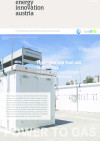Suchergebnisse für "Factsheet: Energietechnologien gestalten, die für alle sinnvoll und nutzbar sind"
SPIDER - Subtraction as a measure to Preserve and Insulate historic Developments by Electric Robots
The purpose of this exploration is to unlock the potential of autonomous, data-driven robots that achieve improvements of the thermal building performance through air entrapments in a continuous process.
openBAM - Open Building Automation Modelling - Open modeling of building automation over the entire building life cycle
Platform-independent modeling of control and regulation logic for detailed study of building automation systems involving construction and building technology. The result enables the analysis of energy saving potentials through building automation before construction.
Joined Workshop - Clean & Efficient Combustion with Advanced Motor Fuels (AMF)
6. November 2019
Montreux, CH
In the course of the AMF ExCo Meeting and the Combustion TCP Task Leaders Meeting, both taking place in Montreux, Switzerland early November 2019, both TCPs will jointly host a workshop. It will focus around low emission propulsion systems, novel fuels for advanced engine concepts, and new developments and trends.
IEA EBC Annex 71: Building Energy Performance Assessment Based on In-situ Measurements
The requirements on building envelope and on building technology are steadily increasing. There is a lack of measurement and analysis methods to control the quality of the built implementation and to optimize the building operation. This project developed a methodological basis to enable an in-situ evaluation of the actual energy performance and building operation. For this purpose, it investigated methods to generate data-driven building models favouring the use of already available on-board data.
Tagung: 5. Nationale Photovoltaik-Tagung
25. Mar 2004 -
26. Mar 2004
ETH ZürichZürich, CH
Integration Solarstrom - Architektur
Innovation meets tradition

Pioneering technologies for renovating historic buildings sustainably
energy innovation austria
1/2014
Herausgeber: BMVIT und Klima- und Energiefonds
Englisch, 8 Seiten
Downloads zur Publikation
Hydrogen and fuel cell technology

in the energy and transport systems of the future
energy innovation austria
2/2015
Herausgeber: BMVIT und Klima- und Energiefonds
Englisch, 8 Seiten
Downloads zur Publikation
IEA Bioenergy Task 40 Newsletter: Halbjahresbericht Juni 2020 - Jänner 2021 (2/2021)

Halbjährlicher Newsletter des IEA Bioenergy Task 40: Bereitstellung biobasierter Wertschöpfungsketten
Herausgeber: IEA Bioenergy Task 40
Englisch, 4 Seiten
Downloads zur Publikation
Sustainable ventilation systems in multi story residential buildings in the conflict areas of hygiene and costs
The goal of this project was to develop guidelines for hygienic and cost-efficient mechanical ventilation systems in residential buildings, in which maintenance and cleaning demands are described. These guidelines are based on existing literature as well as practical experience of the property owners, finally they are based on results of hygienic measurements in existing ventilation systems conducted in this research project.
Building of Tomorrow for the construction industry
Dissemination of results of the research initiative "Building of tomorrow" for two specific target groups - master builder and installer - implementation in further vocational training concepts
win wi[e]n: block development ground floor zone: Optimization of the Viennese block renewal programm as a tool for a sustainable development of street level and open (public) spaces of urban fabric
Development of the Viennese Block Renewal Program with a special focus on the ground floor zone of historical urban fabric (on the basis of the case study Block Renewal Area Ilgplatz, Vienna): sustainable restructuring and reusing of the blocks at ground level, including courtyards and street spaces- as a comprehensive planning approach.
IEA PVPS Task 15: Builiding integrated Photovoltaic (Working period 2019 - 2023)
The IEA PVPS Task 15 promotes building-integrated photovoltaics (BIPV) by overcoming technical and non-technical barriers. Despite its potential, BIPV remains largely underutilised due to economic, legal and normative barriers, lack of knowledge transfer and business models. Task 15.2 addresses these issues through research exchange and bridging gaps between BIPV stakeholders to accelerate the implementation and market penetration of BIPV.
Energy center for the production of heat, power, substitute natural gas and liquid biofuels
The project deals with the production of synthesis gas from biological fuels and biological residues using steam blown gasification. This synthesis gas will be used for polygeneration especially for heat, power, gaseous (substitute natural gas, SNG) and/or liquid fuel production.
Pioneer region for Smart Grids in Vorarlberg: International Connection
New4Old - New energies for old buildings
The project "New4Old - New energy for old buildings - Promoting the integration of RES & RUE measures in historic buildings" aims to promote the integration of renewable energy and energy efficiency technologies into historic buildings, and to create a European-wide network of Renewable Energy Houses in the different Member States of the European Union.
Practice Guide for Sustainable Building Sanitation and Modernisation within Construction Intents

A checklist considering priority, construction progress and actors is elaborated to serve a future-oriented selection of materials, energy carriers, design and construction within building sanitation, under a deliberate consideration of the involved actors from the construction branch
Themen
Oekosan'11 - International symposium for high-quality retrofit of large-volume buildings to plus-energy-buildings
The AEE INTEC organized the international congress "ökosan'11 - high-quality retrofit of large-volume buildings to plus-energy-buildings" in September 2011. The position of Austrian companies in international cooperation was strengthened through personal contacts during the conference.
EnergyCityConcepts - Methods and concepts for the implementation of sustainable energy systems in cities
Two concrete model regions (small city Gleisdorf and urban city quarter Salzburg-Schallmoos) will be developed and tested using new methodical approaches (interdisciplinary urban and regional energy planning, modeling and simulation). Therefore, it is aimed to substantiate scenarios and concepts for the implementation of defined targets on technical, ecological and economic criteria.
GreenDeal4Real - Improving the thermal comfort in mixed-use areas through cost-effective green infrastructure
The aim of the project is to avoid overheating in summer by using innovative greening measures in the mixed residential and commercial area Aspernstraße/Lavaterstraße. The development of a guideline should facilitate the realisation of climate-sensitive projects from strategy to actual implementation and ensure a high degree of transferability to other areas.
